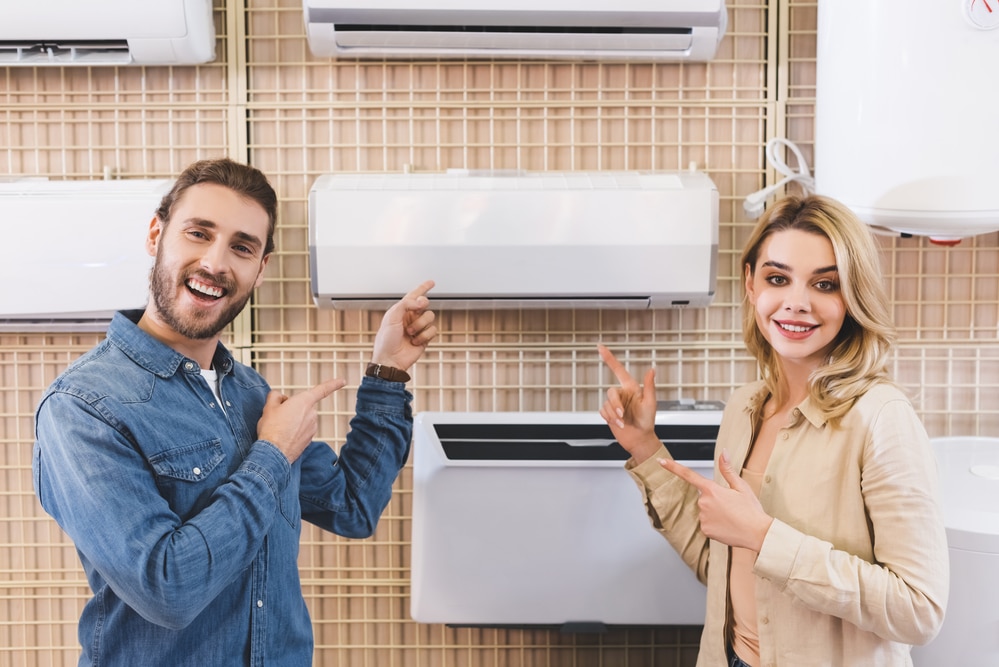Heat Pumps Are Now Effective in Both Warm and Cool Weather
With the evolution of technology, heat pumps have become a viable option for heating and cooling in both warm and cool weather. Heat pumps are energy efficient and cost effective, making them an ideal choice for many homeowners.
Heat pumps are a type of air-source heating and cooling system that works by transferring heat from one place to another. In the summer, a heat pump extracts heat from the inside of the home and transfers it to the outside. In the winter, the process is reversed and the heat pump extracts heat from the outside air and transfers it inside to warm the home.
The main advantage of heat pumps is their energy efficiency. They use less energy than traditional systems, and they can be used to heat and cool a home year-round. Heat pumps are also more cost-effective than other systems, as they require less energy to operate.
Heat pumps have traditionally been used in warmer climates, but with the advancements in technology, they have become increasingly effective in both warm and cool weather. Heat pumps are now able to operate at a greater capacity in cooler temperatures and are able to extract heat from the outside air even when temperatures are below freezing. This means that a heat pump can be used to both heat and cool a home even in the coldest climates.
Heat pumps are also easy to install and maintain. They require minimal effort to operate and are much easier to maintain than other heating and cooling systems. This makes them a great option for homeowners looking for an energy-efficient and cost-effective way to heat and cool their homes.
Heat Pump Technology Has Improved Efficiency
When it comes to heating and cooling your home, heat pumps are a popular choice. Heat pumps have been used for decades, but in recent years, the technology has improved significantly, leading to higher efficiency and lower operating costs.
A heat pump is a device that transfers heat from one area to another. In a typical setup, the pump draws heat from outside air and transfers it inside to be used for heating. In the summer, the process is reversed, drawing heat from inside the home and releasing it outside. This allows it to both heat and cool your home.
The main advantage of a heat pump is its efficiency. Heat pumps are much more energy efficient than traditional furnaces and air conditioners, as they don’t need to use as much energy to move the same amount of heat. This means lower energy bills for you and less strain on the environment.
Recent advances in heat pump technology have made them even more efficient. By using two-speed compressors and variable-speed fans, heat pumps can adjust their performance based on the outside temperature. This helps them to maintain a consistent temperature while using less energy.
Heat pumps also now come with a wide range of features that can help to further increase efficiency. Some models come with built-in thermostats that can be set to turn off the pump when a certain temperature is reached. Others come with timers that allow you to pre-program the pump to turn on and off at specific times, saving you money on energy bills.
Finally, modern heat pumps are now much quieter than their predecessors. This is because of advances in fan and compressor technology that reduce the amount of noise the pump produces.
Many Heat Pumps Now Use Dual or Variable Speed Motors
Heat pumps have become an increasingly popular choice for homeowners looking for a more efficient way to heat and cool their home. While traditional single-speed heat pumps have been on the market for years, many of the newer models now use dual or variable speed motors, making them even more efficient and cost-effective.
Dual-speed motors
Dual-speed motors are a type of motor that can operate at two different speeds: one for cooling, and one for heating. By running at a lower speed for cooling, the motor is able to use less energy, which helps to reduce energy costs. For heating, the motor runs at a higher speed, which helps to more quickly and efficiently heat the home.
Variable speed motors
Variable speed motors are another type of motor designed to provide optimal comfort and efficiency. They are designed to automatically adjust their speed based on the conditions within the home. This helps to ensure that the home is always at the desired temperature, while also using less energy.
Both dual and variable speed motors offer many advantages over traditional single-speed motors. They are able to more quickly and efficiently heat and cool the home, while also using less energy.
This can lead to lower energy bills and a more comfortable home. Additionally, these motors are designed to last longer than single-speed motors, making them a more cost-effective option in the long run.
Heat pumps that use dual or variable speed motors can be a great choice for homeowners who want to reduce their energy costs and increase their comfort. By taking advantage of the latest technology, these heat pumps are able to provide optimal performance at a lower cost.
Heat Pumps Come in a Wide Array of Sizes and Configurations
Heat pumps are an increasingly popular choice for home heating and cooling systems. They are cost-efficient and can provide both heating and cooling from a single unit. They also come in a wide array of sizes and configurations, so you can choose the one that best suits your needs.
A heat pump works by transferring heat from one place to another. In the winter, it uses the outside air to heat your home. In the summer, it reverses the process and cools your home by transferring heat from your home to the outside air. Heat pumps can be used in both residential and commercial buildings.
Heat pumps come in several different sizes and configurations. The most common types are air-source and ground-source. Air-source heat pumps are typically the most affordable and easiest to install. However, the location where you install the heat pump is important for efficiency and effectiveness.
They use the outdoor air to transfer heat into or out of your home. Ground-source heat pumps require more installation work and are usually more expensive, but they can offer significant energy savings due to the more efficient transfer of heat.

Heat pumps also come in a variety of configurations, including split-system, packaged, and ducted systems. Split-system heat pumps are the most common type. They feature an outdoor unit and an indoor unit, which are connected by refrigerant lines.
Packaged heat pumps are self-contained units that contain both the compressor and the evaporator coil in one unit. Ducted systems are similar to split-systems, but the indoor unit is connected to ducts that distribute the heated or cooled air throughout the home.
Heat Pump Installation Is More Affordable with Programmes and Incentives
Heat pump installation is becoming increasingly more affordable and is one of the best ways to heat your home efficiently. In New Zealand, the Warmer Kiwi Homes Programme provides grants and co-funding for homeowners to install heat pumps in their homes.
The Warmer Kiwi Homes Programme provides grants and co-funding for homeowners to install heat pumps in their homes.
- Covers up to 80% of the total cost of ceiling and underfloor insulation, providing significant savings for homeowners.
- Covers 80% of the cost of an approved heater and other energy efficiency measures, making it even more affordable.
Heat pumps are not only more affordable to install, they also provide significant savings on energy costs. Heat pumps are up to five times more efficient than traditional heating methods, resulting in lower energy bills. Additionally, heat pumps are better for the environment as they do not produce any emissions, resulting in a cleaner and healthier home.
Conclusion
Heat pumps are becoming increasingly popular as an energy-efficient and cost-effective option for heating and cooling in both warm and cool weather. They are easy to install and maintain, and they can be used to both heat and cool a home even in the coldest climates. With their increasing popularity, heat pumps are sure to remain a viable option for many homeowners for years to come.




